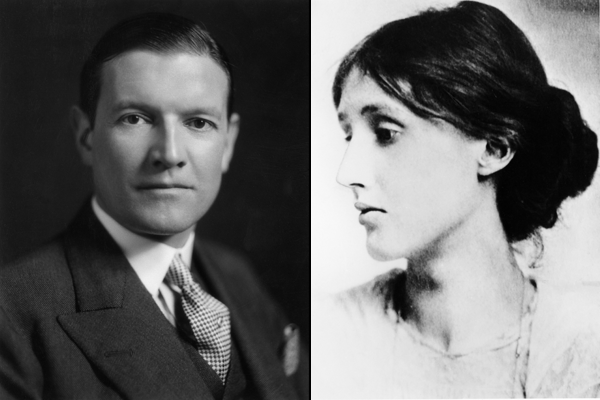This book is not a history, explains Ruth Winstone, who has edited this collection of excerpts from diaries published between 1921 and 2011. It is, she says, ‘an impressionist view of politically changing times’. It is, indeed, a patchwork quilt of a book, no two pieces precisely meshing with each other yet providing in total a remarkably clear and coherent portrait of 90 stressful years.
It is ‘a political diary’, but Winstone admits that the definition of ‘political’ became more and more elastic as the book took shape. It is all the better for it. Some of the most enjoyable passages have only a tenuous link with the world of public affairs but it would have been sad to lose Virginia Woolf on Ulysses — ‘an illiterate under-bred book’ she thought it, which left her ‘puzzled, bored, irritated and disillusioned as by a queasy undergraduate scratching his pimples’.
Or Noel Coward dismissing Waiting for Godot as
pretentious gibberish. It is nothing but phoney surrealism. It has no form, no basic philosophy and absolutely no lucidity.
Or Evelyn Waugh at a party
where we found some very odd painters quite drunk and rather naked. The party was given in honour of a negro who is acting in a play called Emperor Jones but he had a fit in his dressing-room.
The majority of the entries, however, relate to the political state of the nation. Most of the diarists are insiders — powerful figures like Dalton, Macmillan or Gaitskell, or the people who keep the machinery of government running like Jock Colville, Cadogan or Bernard Donoghue.
Inevitably, such people are better informed than the outsiders, but it is often the outsiders who provide the most interesting comments. Nella Last, the housewife who made so notable a contribution to the records of Mass Observation, offers shrewd common sense, while Beatrice Webb (not that she would have considered herself an outsider) provokes endless wonder that a woman of such intelligence should have been so gullible when it came to Communism:
The salient and distinctive feature of Soviet Russia [ she wrote in 1922] is the establishment of a Spiritual Power over and above the ostensible government. This new social order … alone among states, is increasing the material resources and improving the health and education of its people.
On the whole it is the more wrong-headed of the diarists who are the most fun to read. Alan Clark is almost always outrageous yet compulsively enjoyable:
Filled with loathing of the electorate. Those filthy [train] carriages on the trip down yesterday … is the nation completely rotten? Yes, and has been since 1916.
Barbara Castle is marginally less absurd, but her views on the channel tunnel are, to say the least, idiosyncratic. She had, she wrote,
a kind of earthly feeling that an island is an island and should not be violated. Certainly I am convinced that the building of a tunnel would do something profound to the national attitude.
One of the more rewarding features of reading diaries is to find oneself confronting as a novelty something which is now taken for granted. Harold Nicolson in 1939 first saw television. ‘Compared with a film,’ he wrote,
it is a bleary, flickering, dim, unfocused, interruptible thing. But as an invention it is tremendous and may alter the whole basis of democracy.
Macmillan in 1962 reads with alarm a medical report on the dangers of smoking: ‘This puts us in rather a fix. For how are we to get £800m indirect revenue from any other source?’ Tony Benn in 1976 records a Cabinet discussion of the Falkland Islands:
There was possibly some oil there and we couldn’t hold the islands against an attack. He [Callaghan] had two suggestions, one of which was to … let sovereignty pass to the Argentinians and lease the islands back.
Nicolson would have felt justified by subsequent events: Benn and Macmillan would probably have felt that they might have put it differently. It is greatly to the credit of the diarists or their heirs that they felt no need to conceal their blunders or misjudgments from the critical eye of posterity.
Most readers will have a favourite diary entry which they will wish Winstone had included. Though Chips Channon appears often, I miss his description of hearing Edward VIII’s abdication speech. He was at a dinner party and everything stopped while the company listened to the King’s ‘manly, sincere farewell’. Then: ‘There was a stillness in the Stanleys’ room. I wept, and I murmured a prayer for he who had once been King Edward VIII. Then we played bridge.’ Rarely can a sentence more neatly have encapsulated a national mood. Britain too shed a cursory tear and then it was back to the bridge table.
One can’t get everything in, though. Winstone — best known for her masterly editing of the diaries of Tony Benn — has done a remarkable job of selection. Almost every page contains something unmissable; and the book as a whole provides a painless introduction to almost a century of British history.






Comments